|
|
|
Dear reader, |
|
|
| |
|
Global environmental change and armed conflict are two of the greatest challenges of the 21st century. And they are more interlinked than one might think: According to the UN, 40 percent of interstate conflicts in the last 60 years have involved disputes over natural resource distribution, which are aggravated by environmental degradation. In the very near future, it is likely that climate change will further exacerbate the situation and lead to more conflict.
In this year’s Berlin Summer Dialogue, we therefore explore environmental peacebuilding, a concept that brings together conflict prevention and environmental protection. It focuses on how the joint management of natural resources and environmental problems can support peace and cooperation, particularly on the local level. Our online conference will discuss case studies and constructive solutions from different world regions.
This subject is further explored in the new GLOBAL TRENDS. ANALYSIS 1|2022 by author Tobias Ide, a Director of the Environmental Peacebuilding Association. An ideal introductory read before the conference!
Find out more about this and other new publications and events in this newsletter.
We wish you all the best! Enjoy reading.
Kind regards, Elena Sondermann,
Institute for Development and Peace (INEF) |
| Ingo Nordmann,
Development and Peace Foundation (sef:) |
|
|
|
| |
|
UPCOMING EVENTS
|
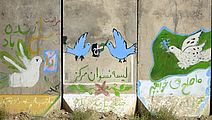 © flickr.com/UN Environment/Alec Knuerr | The Berlin Summer Dialogue 2022 – Online Edition 20-29 September
4 Sessions each Tuesday and Thursday, 15:00-16:30 hrs (CEST)
In the run-up to this year’s climate negotiations in Egypt, the Berlin Summer Dialogue will focus on opportunities and limits arising from environmental peacebuilding through hands-on experience from practitioners around the world.
Participation is by invitation only. If you are interested, please send a short email to nordmann@sef-bonn.org. |
 |
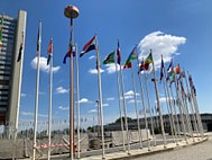 © Carmen Wunderlich |
Public event and conference
27 October and 31 October-2 November, Berlin
At the public evening event "The Future of Nuclear Ordering” on 27 October, experts will discuss the state and future of the nuclear order with political representatives. The event is part of a larger networking project on "The Complexity of Nuclear Ordering", funded by the German Foundation for Peace Research (DSF). If you are interested in participating, please contact Carmen Wunderlich.
An international conference on "New Age, New Thinking: Challenges of a Third Nuclear Age" will also be held in Berlin from 31 October to 2 November. Organized by INEF Associate Fellow Carmen Wunderlich together with International Student/Young Pugwash (ISYP), the conference is aimed at students and young scholars concerned with challenges posed by nuclear and conventional technologies for the so-called "third nuclear age". The submission of proposals is still possible until September 10.
|
 |
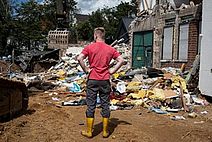 © Caritas international/Philipp Spalek |  Save-the-date: Reducing disaster risks as a part of sustainable development Save-the-date: Reducing disaster risks as a part of sustainable development
Bonn Symposium 2022 7-8 December, Bonn
The risks of natural and man-made disasters for communities worldwide are increasing dramatically. Extreme weather events, often triggered by climate change, are becoming more frequent, making holistic disaster prevention and efficient crisis management indispensable for achieving the Sustainable Development Goals (SDGs).
We will discuss potential solutions and best practices from around the world at this year’s Bonn Symposium, which we are conducting in cooperation with the Service Agency Communities in One World of Engagement Global (SKEW) and the German Committee for Disaster Reduction (DKKV). Mark the 7 and 8 December in your calendars now! More information will follow soon. |
|
PUBLICATIONS
|
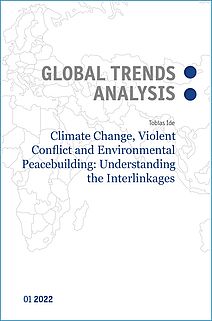 |
GLOBAL TRENDS. ANALYSIS 1|2022
In many parts of the world, climate change has severe impacts not only on human security but also on economic and political stability. It increases resource competition, recruitment opportunities for armed groups, and migration.
Environmental peacebuilding as a comprehensive approach can address climate-related conflict risks by focussing on how the joint management of natural resources and environmental problems can support peace. In GLOBAL TRENDS. ANALYSIS 1|2022, Tobias Ide describes the core mechanisms of environmental peacebuilding to facilitate climate-resilient peace. |
 |
 © INEF/Frank Bliss |
AVE Study 30
A new study by INEF deals with the deposit of land titles as collateral for loans in Cambodia. A survey of more than 1000 households across the country sheds light on the background and impact of rural credit and formulates recommendations for improvement. The study was produced as part of INEF's project "Ways out of Poverty, Vulnerability and Food Insecurity“ (AVE), which is funded by the German Federal Ministry for Economic Cooperation and Development (BMZ). |
 |
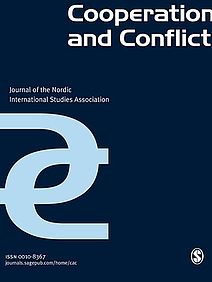 © Cooperation & Conflict |
Article in "Cooperation & Conflict"
INEF researcher Christian Scheper addresses the problem of persistent human rights violations in global value chains. A new article analyses large corporations, their networks and agency and calls for putting the conditions for the emergence of their power at the centre of the debate. A preprint version of the article can be read here. |
|
REPORTS AND FINDINGS
|
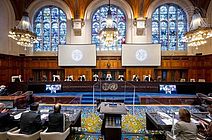 © UN Photo/Frank van Beek |
sef: Policy Lunch, Brussels, 31 May 2022
Existing multilateral structures are struggling to find appropriate responses to novel crises, because they are still based on a 19th/20th century architecture. The sef: Policy Lunch on 31 May looked at possible solutions for this challenge under the title “Making the Multilateral System Fit for the Future – The role of the European Union in revitalising international law”.
It was the first Policy Lunch to be held in person in Brussels since March 2020 and built on a Global Governance Spotlight recently written by Maja Groff . It discussed what the strengthening of international law and its institutions could look like, and the potential role of the European Union. Please find the report of the event here. |
 |
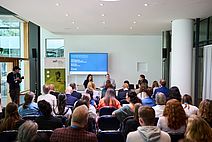 © sef: |
sef: Session at the Deutsche Welle Global Media Forum, 20 June 2022
During the Covid-19 pandemic, many governments have used crisis response as a pretext for restricting civil rights and freedom of expression. The sharp increase in “fake news” has at the same time prompted them to enact strict anti-disinformation laws. However, these have also been abused to crack down on free press, notably in India, Thailand and Singapore.
This year’s sef: session at the DW Global Media Forum discussed how journalists can deal with these challenges. Find the full conference report and a few pictures here. |
|
|
|
|
|
The Development and Peace Foundation (sef:) was founded in 1986 on the initiative of Willy Brandt. It is a cross-party and non-profitmaking
organisation. sef: provides an international high-level forum for shared thinking on the complex challenges of globalisation. It is linked to the
Institute for Development and Peace (INEF) by a cooperation agreement. The aim of INEF’s application-oriented research is to build bridges
between theory and practice. It is one of three host institutions of the Käte Hamburger Kolleg / Centre for Global Cooperation Research.
|
|
|
|










